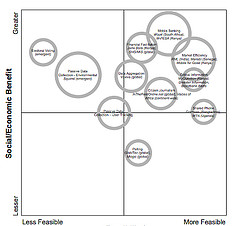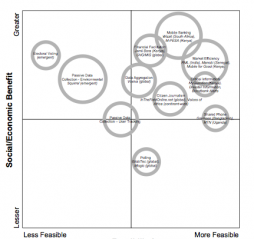Mobile phones are transforming economic life for consumers in developing countries, says a new report by David Lehr. The report Going Wireless: Dialing for Development, focuses on "base of the pyramid" consumers and the ways that mobile phones have the potential to change economies in the developing world. Lehr writes,
The mobile phone has established itself as the communication and networking platform of choice for billions of the world’s consumers, most of whom are at the base of the global economic pyramid. Worldwide, mobile phone subscribers outnumber Internet users almost 3 to 1, with much of that gap coming from skyrocketing mobile phone use in Africa, India and China. Analysts estimated thatThroughout the report, Lehr emphasizes the reasons that mobile phones can have a larger impact for base-of-the-pyramid consumers than for people in the developed world. "Having access to information may save a few minutes in the developed world; in rural areas, it may save a day’s travel time, lost wages or an entire year’s vegetable crop," he writes. In developing countries mobile phones have a greater impact than the Internet, especially considering the wide availability of low-cost phones and pre-paid calling cards. "The increased mobility and accessibility of the mobile phone has the potential to have an even greater impact than broadband Internet, particularly in low‐income rural areas where alternative communication platforms remain scarce," Lehr writes.
sixty‐five percent of all handsets made in 2007 would be sold in emerging markets.
Unlike other reports that MobileActive has authored or written about -- including Wireless Technology for Social Change: Trends in NGO Mobile Use and Rapid Assessment of Cell Phones for Development -- Dialing for Development focuses more on sustainable business models for mobile phone use than mobile phone use from an NGO perspective. Although NGOs are mentioned, it is in the context of how NGO projects can become financially self-sustaining. The report focuses on "social entrepreneurs; technology innovators; economic development agencies; incumbent service providers and emerging commercial ventures."
Dialing for Development also contains a section on lessons learned:
- "Listen to Users Early and Often." -- It's imperative to understand cultural issues -- including language -- of areas where you are working.
- "Contribute to Financial and Business Viability." -- Develop metrics to evaluate if technology is successful, and make smart choices about when to use human labor and when to use technology.
- "Utilize Rapid Prototyping." -- Make models of mobile phone applications (even if you use paper and pencil) before spending the time to write the actual code.
- "Do Not Underestimate the Costs of Market Education."-- Realize that some consumers won't perceive benefits of certain applications. For example, people who have never had bank accounts may not understand why mobile banking would be useful.
- "Recognize Incumbents and Regulatory Challenges." -- Many applications are network-specific. One way around this is to use SMS, which works almost universally.
- "Heed Hardware Limitations and Existing Technology Usage." -- Recognize the limitations of low-cost phone used by many people in the developing world.
- "Acknowledge the High Costs of Technology and Implementation." -- Developing mobile applications can be expensive.
- "Think Like a Network." -- Find creative ways to build a network of users.
- "Don't Reinvent the Wheel." -- Research what has already been done, and build on that.
Perhaps the most interesting analysis of "Dialing for Development" a depiction of "Mobile Application Assessment Framework." 
The graph includes three ways to evaluate "existing or emerging mobile phone applications": feasibility, social economic benefit, and disruptive impact. Feasibility and social/economic benefit are placed at either axis of the graph, and disruptive impact -- basically, how big an impact an application has compared to previous methods/tools -- is reflected in the size of the bubble.
For example, Lehr ranks mobile banking and market efficiency as fairly high on all three scales. Electoral voting, on the other hand, is low in feasibility but fairly high on the benefit scale. One interesting categorization is "shared phone" -- Lehr lists Grameen in Bangladesh and MTN in Uganda as examples -- which is ranked highly feasible, only moderately beneficial, and not very disruptive. This is supported by Lehr's description of shared-access phone programs in the report. He writes, "With falling phone and service prices; increased competition among the mobile operators; and improvements in coverage, profits for these “village phone” operators are falling. In countries such as India and China where rates and equipment prices are already among the lowest in the world, the Grameen model may be less attractive." (We wrote about this here on the MobileActive blog.)
One downside of this graph is that it is not country or region specific. Whereas the Grameen model may no longer be beneficial in india, it may be more likely to have a disruptive impact in regions of the developing world with less mobile phone penetration.
Overall, the report is useful to people or businesses developing mobile phone applications for the developing world. We would have like to have seen more NGO-specific recommendations and a review of projects developed by nonprofits. Although the lessons learned are useful, they are targeted at people or businesses for whom financial success, in addition to social good, is a high priority.
The report's author, David Lehr, was a 2007 Acumen Fund Fellow and 2006 Reuters Fellow with the Digital Vision Program at Stanford University. He is currently a consultant for several non-profits.


Overall, the report is
Overall, the report is useful to people or businesses developing mobile phone applications for the developing world. We would have like to have seen more NGO-specific recommendations and a review of projects developed by nonprofits. Although the lessons learned are useful, they are targeted at people or businesses for whom financial success, in addition to social good, is a high priority.
Barry Jenkins - Petition Inc. CEO
Post new comment